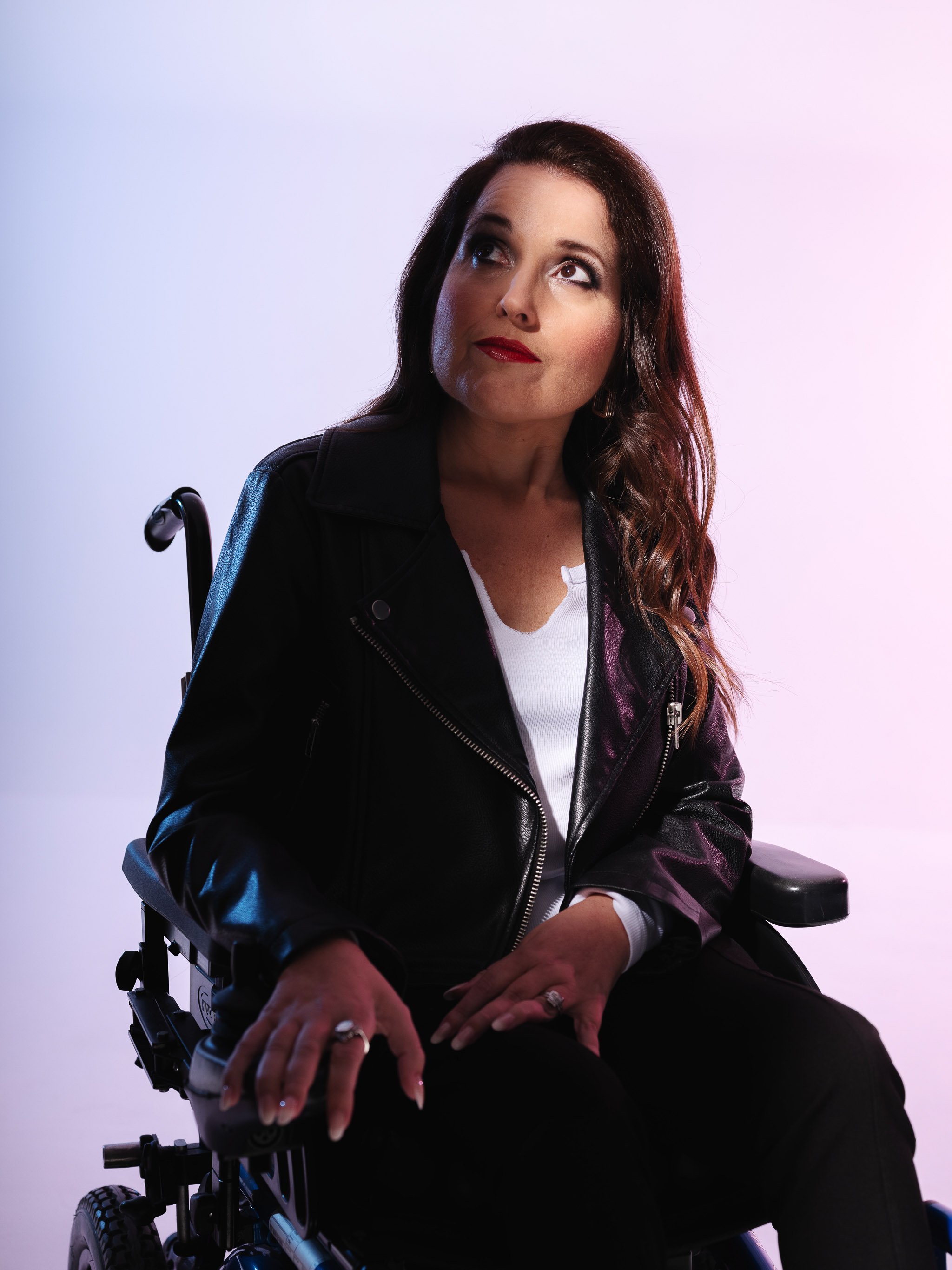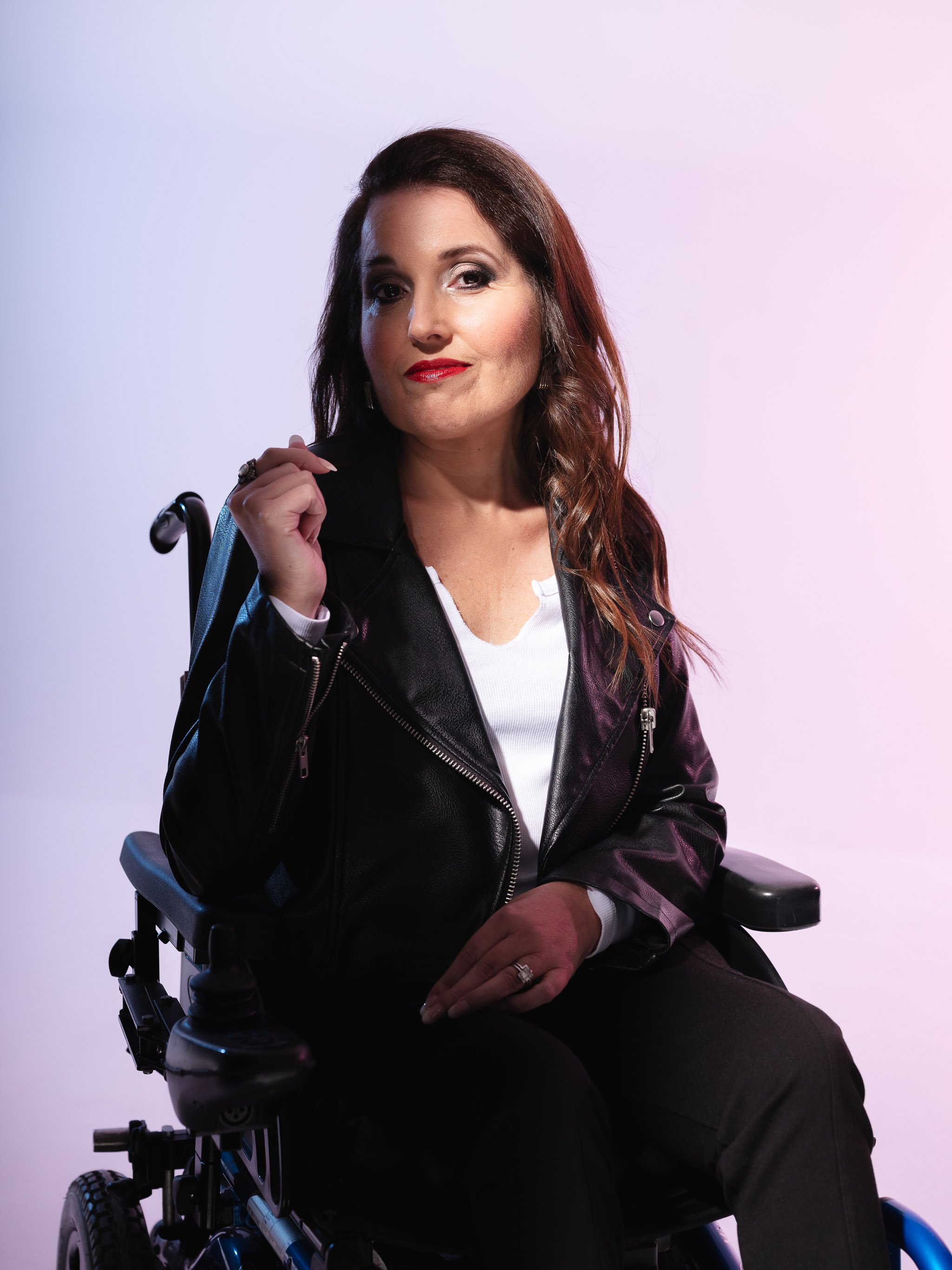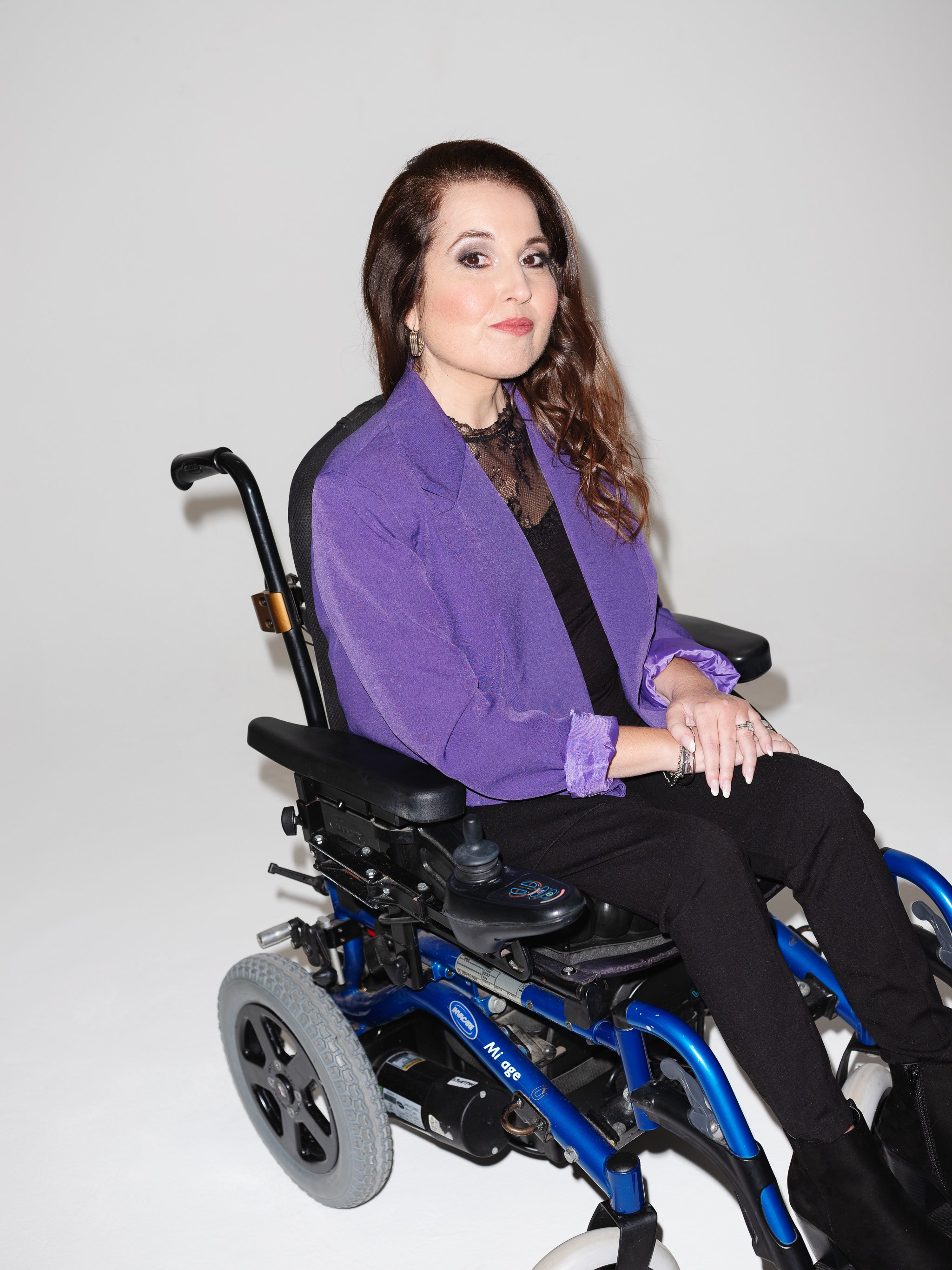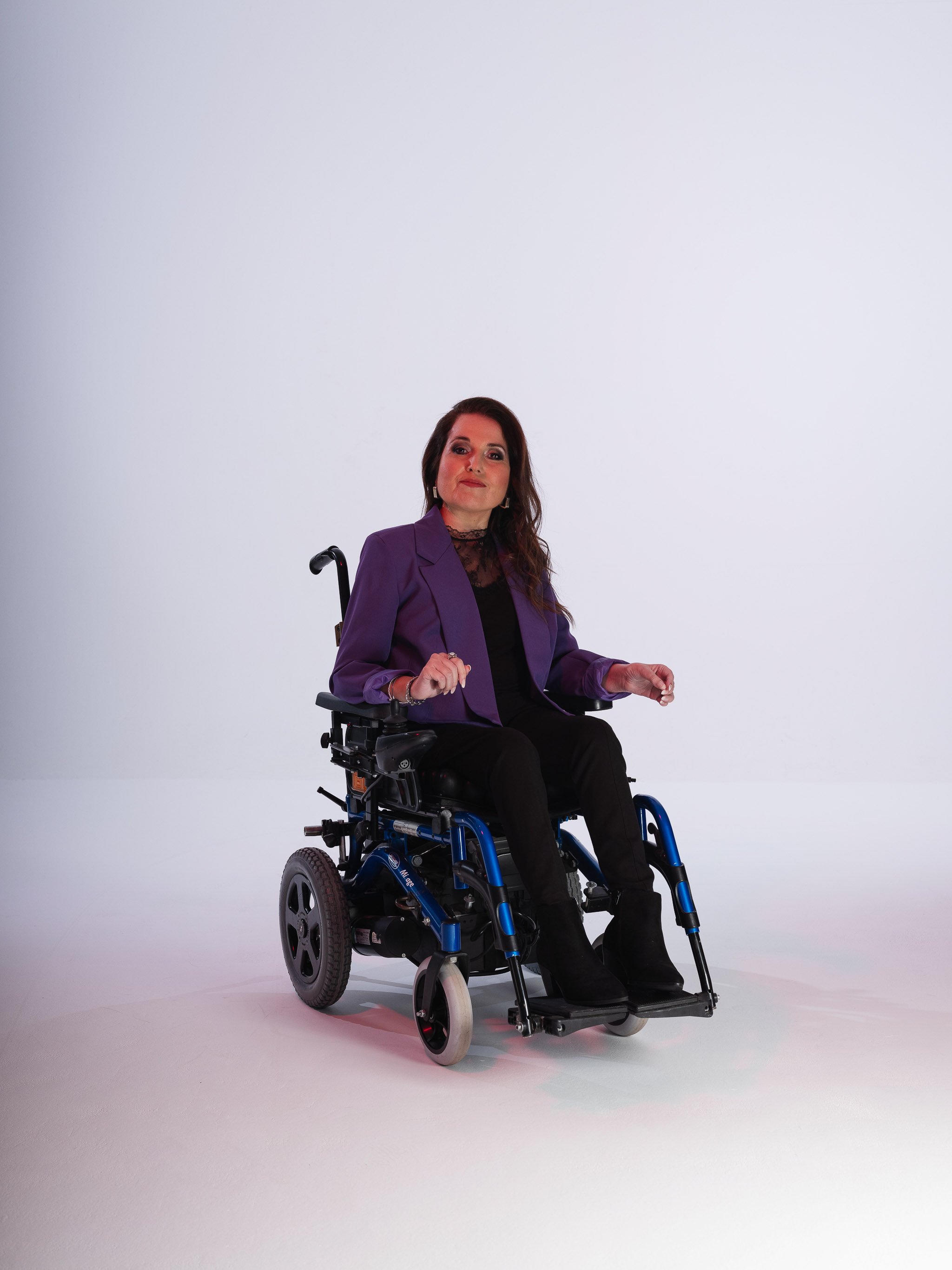Kim Tserkezie
Do you see the real me?
Interview by Alison Cowie
Photographs by Christopher Owens
Actor, presenter, writer and producer Kim Tserkezie has had to fight to be taken seriously and she’s now doing the same for other underrepresented groups through her North East-based production company, Scattered Pictures. Here, Kim reveals the importance of having a more open creative sector and why, despite her success, she’s still not seen an authentic version of herself on screen.
Kim Tserkezie may have grown up in Gateshead, Tyne and Wear, in the 70s and 80s, but on Sundays she was transported to faraway lands thanks to the classic black-and-white movies she’d watch with her mum before the roast dinner was served.
Despite being spellbound by the storytelling and the actors who portrayed them, the youngster diagnosed with spinal muscular atrophy never saw anyone like her on screen.
Her parents – a native North East mother and a father who emigrated from Greece - fought for Kim to attend a mainstream school from which she has fond memories. But as a wheelchair user, she couldn’t explore her love of drama as the school stage was inaccessible. Instead, she attended every production as an audience member where she graciously supported her friends perform.
Kim admits it wasn’t until her early 20s that she became involved in the local disabled community.
“When I left home, I moved to an area with some accessible flats, where I met other disabled people.
“Up until that point, I’d always been with non-disabled people and I had this sense that it was just me, which could be painful at times. Then suddenly, I was with like-minded disabled people would understood how I felt.
“They were also politically conscious around disability rights and underrepresented groups and they taught me a lot. It was a big turning point for me.”
Kim had always been interested in television – thanks to an influential media studies teacher who encouraged her to go in front of the camera in class – but she never considered it could be a career for her.
She then saw an advert looking for a disabled presenter to front a new BBC2 show called Disability Today.
“I thought I’d give it a go,” Kim reflects. “They got masses of applications but I got invited down to London and got the job.”
From Disability Today, Kim moved to primetime BBC2 show From the Edge, where she travelled the country doing everything from flying a microlight aircraft to reporting outside the Houses of Parliament.
“It was a brilliant time and I loved every minute,” she adds.
“I realised on set that acting was the missing thing from my life. I knew I had to pursue it”
Kim was settling into her new role as a presenter when she was invited to audition for a new ITV drama with Robson Green and Imogen Stubbs.
Despite never acting before, she accepted the invitation and got the role. It was an experience that proved transformational.
“I realised on set that acting was the missing thing from my life. I knew I had to pursue it,” Kim explains.
The budding actor applied to drama schools but found that no regional course could accommodate her due to her disability.
As a last resort she tried a local theatre company based at Live Theatre, where Tim Healy, Stephen Tomkinson and Sarah Millican, among others, honed their talents.
To her delight, the theatre company accepted her and she was soon on stage playing parts in Alan Bennett productions.
But beyond Live Theatre, Kim found it frustratingly difficult to find exciting roles.
“I was only ever considered for parts focused on disability,” she says. “That jarred with me.”
“From a young age, I’ve felt like I’ve been put in a box that I’ve had to fight my way out of”


Kim’s fortunes changed when she was offered a main role in hit children’s television series Balamory, where her portrayal of Penny Pocket became a firm favourite with the young audience between 2002 and 2005.
But post Balamory she was dismayed to still find limited opportunities for roles.
The enterprising actor realised that if things were going to change, she’d have to do it herself.
“From a young age, I’ve felt like I’ve been put in a box that I’ve had to fight my way out of,” Kim reflects. “But that’s given me the resilience not to accept things.”
The North East actor began meeting with local writers and producers to help develop more inclusive roles for her. But the more she spoke to people in the industry, the more she found her plight was echoed in many other underrepresented groups in the North East.
“I found there were lots of people like me who were having to leave the region for work. “They felt isolated for so many reasons.”
Kim decided to establish her own independent television, film and audio production company, Scattered Pictures to champion diverse perspectives.
“The industry for too long has serviced the white, male, middle-class community, but there are plenty who fall outside of that. At Scattered Pictures, we prioritise those people.
“It could be a woman with children who wants to get back to work or those from deprived socioeconomic backgrounds. It’s hard to create a programme when you've not got money to pay the rent, but you find new creative ways to make things happen.”
Scattered Pictures is currently supporting two up-and-coming North East talents – stand-up comedian Louise Young, who has supported Jason Manford and Alan Carr on nationwide tours, and Kema Sikazwe (aka Kema Kay) a musician and actor who has developed a TV script about his experiences leaving Zambia for Tyneside.
“There's never been a disabled person leading a British romcom but I’m hoping it’s a story everybody will connect to. It’s not a disability storyline, it’s about two people meeting and showing that we are more alike than we think.”
“It’s a joy to see Louise’s and Kema’s enthusiasm,” Kim says. “I know how difficult it is to keep going and so to support them in achieving their dreams is very rewarding.”
Scattered Pictures has collaborated with the BBC, ITV, Channel 4, Fremantle Media and Tiger Aspects on a range of projects, and it has worked with the BBC World Service and global sports producer IMG Productions to deliver Hidden Sport – a radio show hosted by Kim that explores often overlooked sports.
“We looked at Dambe boxing, drone racing and a new sport that’s been developed in London called Switch. It was thrilling to tell the stories of these sports and I met some fascinating people,” she adds.
Kim is also excited that a project by Scattered Pictures has been shortlisted for Breakout, a partnership between Creative UK and Netflix to discover the next generation of storytelling.
“It’s a romcom about two regional radio DJs who get a big gig in London. One is from a privileged background who is not happy when he finds out the radio station is insisting he has a new co-host.
“There's never been a disabled person leading a British romcom but I’m hoping it’s a story everybody will connect to. It’s not a disability storyline, it’s about two people meeting and showing that we are more alike than we think.”
“If it gets made by Netflix, it would be dream-come-true stuff.”


“I don't get up in the morning and think, ‘Let's discuss how it feels to be disabled today’”
Kim, who has been named one of the top 100 most influential disabled people in the UK, recognises there are more disabled and underrepresented groups on screen now compared to when she was growing up. But, she says, there is still a long way to go.
Kim believes more representation across all levels of television and film-making is crucial.
“We need genuine inclusive representation at the funding and commissioning levels,” she maintains, “because no matter how much work we do on the ground, we're going to get stuck and not be able to make the projects that we want.”
Kim - a BAFTA member since 2014 and deputy chair of BFI’s Disability Screen Advisory Group - continues to champion for more diversity in the creative sector and has hosted several BFI Busting the Bias events.
But the actor, presenter, writer and producer is also keen that disability does not solely define her as a creative.
“Over the years, I've found it difficult to get past people wanting the disability story from me,” she explains. “I've had to work hard to write and create projects to show that, as a disabled person, I don't get up in the morning and think, ‘Let's discuss how it feels to be disabled today’. I'm thinking, ‘What do my kids need for school? What are we going to have for breakfast? When do I have to leave for work?’
“As a disabled person, we play many roles in life but I can honestly say that I’ve still not seen the ‘real’ me yet on screen.
Kim may still be fighting to get out of the box she’s been put in, but you wouldn’t bet against little girls and their mums in the future spending Sundays watching the ‘real’ Kim Tserkezie.
Learn more







